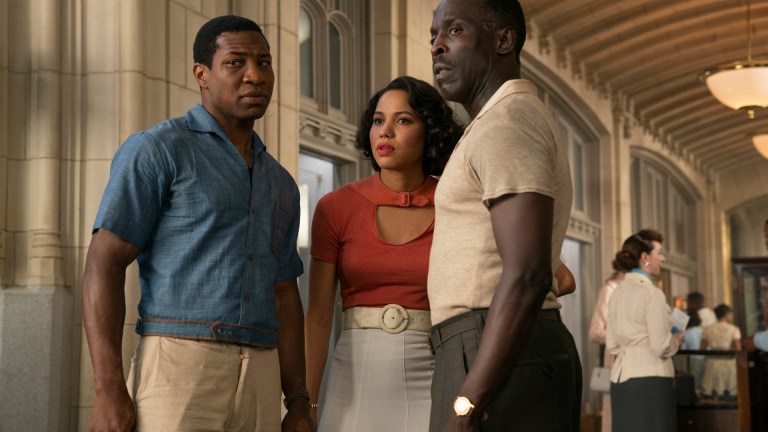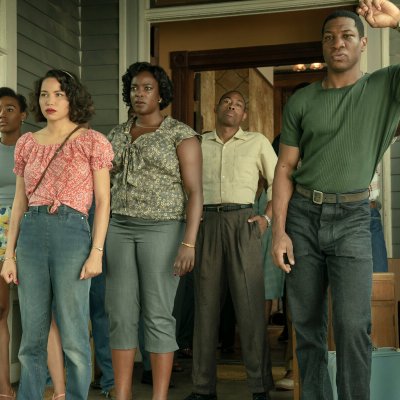Lovecraft Country Episode 4 Review: A History of Violence
This week's Lovecraft Country takes us on a Journey to the Center of the Earth as Tic searches for the key to unlocking his power.

This Lovecraft Country review contains spoilers. The episode is available to stream now on all HBO platforms.
Lovecraft Country Episode 4
Christina pulls into the Northside in her silver Bentley, unscathed, backdropped by Rihanna’s “Bitch Better Have My Money”, perfectly capturing her vibe of wealth and privilege and lack of fucks to give. A mood. Neither the destruction of Ardham Lodge or Tic’s ill-advised murder attempt have slowed her down, and she’s up to her usual cryptic nonsense. She’s looking for Hiram’s orrery, apparently the key to his time machine—because why not?— and has upset the local wizard wannabe, Captain Lancaster. Now, she has to contend with Winthrop’s branch of magical miscreants on top of playing whatever game she’s playing with Tic.
In “Whitey’s On The Moon” Christina was very delicately manipulating her father and Tic for her own agenda, under the guise of helping the Sons of Adam reach their goals. With Samuel apparently out of the way, she is now openly engaging in a power play, which is fun to watch even if I do hope the primary focus remains on the Black characters.
Christina’s arrival on Leti’s doorstep kicks off a National Treasure-like adventure for Tic n’em to find Titus Braithwhite’s hidden pages from the Book of Adam before Christina, or any of the 34 remaining lodges do. After some resistance, Montrose agrees to help Tic and Leti on their quest, given his research into Dora’s history, and into the Order of Ancient Dawn. The dynamic between Tic and Montrose, and the undercurrent of violence, makes them fascinating to watch.
Tic, Leti, and Montrose find Titus’ vault entrance in a Boston museum, and follow its north tunnel, across a chasm, past a death trap, beyond a puzzle door, and through miles of increasingly flooded passageways to Leti’s elevator— in the northside of Chicago. Magic, amirite? Some viewers will take issue with how little time is spent on the puzzles and code-breaking, which are the funner aspects of a “treasure hunt.” With Montrose’s knowledge of the bylaws and all their fictional references, they breeze through obstacles like a disappearing plank.
In last week’s episode, Leti’s elevator descends beyond the basement into a tunnel of death, and now we know where the tunnel goes. If there was a question of whether Leti was aware of her white neighbors’ bodies, her reaction seeing one float by should assuage any lingering concern that she knew—but her casual acceptance that they’re back in Chicago could be seen as too convenient. It’s reasonable to assume the other tunnels they didn’t take have equally puzzling endpoints, and the possibilities of what those hold are chilling and exciting.
Tic, Leti, and Montrose find Titus’ vault, and Tic unlocks it, revealing a chamber full of the remains of Indigenous people. When they attempt to remove the Titus’ pages from the hands of a corpse, Yahima (Monique Candelaria), is reanimated. Yahima tells tale of translating for Titus before refusing to continue. We know all too well that “exploration” often means exploitation, and it comes as no surprise that Titus murdered their entire family to coerce Yahima to translate his scroll. It’s even less surprising that he would imprison them, in life and in death. Lovecraft Country is awash in unsubtle homages to colonialist and racist harm.
Back in the relative safety of Leti’s home, Montrose slits Yahima’s throat. Montrose is a tortured man, and is made more so by the weight of the knowledge he’s learned about the Order of Ancient Dawn. As a Black, queer, man, he is already up against hate from racists and homophobes. And now he knows that an already unfair world is even more unfair, that magic gives advantage to those who would seek to harm his own, even without the additional power magic affords them. His son, forever entwined with magic and the legacy of the Sons of Adam, is always in danger because of his forebears. Montrose is heavy with fear, and Michael K. Williams embodies this with a superb performance. Fear drives him to destroy the bylaws and the only person alive capable of reading pages from the Book of Adam.
This episode expands the world of Lovecraft Country and gives us a sense of how vast the narrative is. As Leti tells Tic when he insists she and Montrose take the elevator to safety, “it’s not only just getting dangerous, he got kidnapped, I died, can you stop acting like this is only happening to you!” Tic has been seeing himself as the lone protagonist, the singular hero, but he has never been facing this alone, nor is he the only one who has been affected.
Ruby, for instance, is estranged from Leti. And outside of their brief attempt at sisterly bonding and cohabitation, Ruby is completely removed from Ardham and the Sons of Adam. Yet, even Ruby’s limited proximity to Leti makes her of interest to Christina and William. When she goes to apply at a department store for the upteenth time, she finds another Black woman —who applied “on a whim”— has been hired instead. She drowns her sorrows in booze and blues, at Williams’ invitation, and laments her circumstances. When she has sex with William —questionably ignoring his satanic-looking body art/modification— we know that there’s an ulterior motive, but Ruby doesn’t know magic exists, or that there’s reason for her to be pawn.
Tic behaves as though he’s the center of this universe, but we see magic touch everyone. Take Hippolyta. She has never trusted the story she was told about George’s death, and has sensed a wrongness about it. At Leti’s housewarming party, she is drawn to the orrery, which she takes; the very same magical orrery Christina and Lancaster are looking for. When she and Diana are driving home from Boston —without Tic n’em who took the magic tunnel route— she’s drawn to Ardham, and changes course, straight into the shoggoth’s den. We can call it instinct, but Hippolyta seems attuned to magic. Tic may not be the only person with an intrinsic magical connection.
It would be easy for Lovecraft Country to rest on a Chosen One and leave all of the heavy lifting to its male lead, but it’s clear Misha Green has a bigger vision for the show, and seems eager to give each character an opportunity for heroism.
What makes this episode so compelling is how it introduces magic to the characters who have so far been on the periphery. Ruby and Hippolyta are both beginning to glimpse the real world, the magical world, and the story can only be elevated by their full immersement into magic and the complex structures of powers that surround it. Lovecraft Country continues to broaden its scope, while maintaining its sense of intimacy. The satisfying way it marries character-driven drama and sci-fi spectacle continues to enthrall.
Additional thoughts:
On Montrose: As of this episode, Montrose is queer-coded but not explicitly queer. In episode one, George tells Tic that Montrose got the worst of their fathers beatings. In episode two, George remembers Montrose greeting the league baseball players when they’d leave for the season, and Montrose recounts the beatings he got for that. Both implying that part of the abuse was their father’s response to Montrose’s perceived softness. In this episode, Tree suggests to Tic that Montrose is “getting close” with Sammy, who we met in episode one being intimate with another man.
Tree should be fought upon for being messy, in regards to both Montrose and Leti.
On Yahima: Yahima is Two-Spirit, which is an Indegenous-American umbrella term for a unique gender identity that can encompass intersex and transgender identities, but doesn’t always. Visually, Yahima reads as a trans or gender non-conforming person, and as such, the camera’s gaze repeats familiar, harmful patterns in media that sensationalize and otherize trans/intersex bodies. Yahima is also violently killed, which is another, unfortunately common trope.
There is something to be said about normalizing non-standard expressions of gender, and including characters who just happen to be intersex could be powerful. But that inclusion cannot come at the expense of those being reflected. Lovecraft Country makes a point of naming injustices, but the storytelling in this episode doesn’t justify Yahima’s inclusion, and the potential harm to trans/intersex viewers may be an injustice in itself. As always, intent < impact.
On Tic & Leti: I both like the idea of their relationship and am exhausted by it. It’s hard to determine whether they are bonded by shared attraction or shared trauma, and even if it’s both, it feels a lot more of the latter. Keeping them platonic feels like the more subversive choice but there is power in opening yourself to another person.
Ruby, girl, I get the appeal, but what is you doing?
Hippolyta. Sis. Please.

